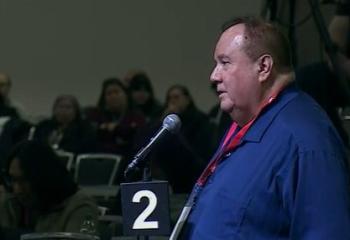Image Caption
Local Journalism Initiative Reporter
Windspeaker.com
Canada’s Attorney General and Justice Minister David Lametti has committed to “looking at” rescinding Natural Resources Transfer Agreements (NRTA) to the provinces.
In the 1930s, Canada entered into a series of agreements that transferred federal administration and control over land and natural resources to Alberta, Saskatchewan and Manitoba.
“Those resources were given to provinces without ever asking one Indian if it was okay to do that or what benefits would the First Nations expect to receive by Canada consenting to that arrangement,” said Chief R. Donald Maracle of the Mohawks of the Bay of Quinte.
“Canada inherited rights and obligations…from the imperial treaties made with our people…We see that as foundational in our rights… being consulted on any benefit,” said Maracle.
About a dozen chiefs and proxies addressed Lametti at the Assembly of First Nations Special Chiefs Assembly on April 5.
Grand Chief Brian Hardlotte of the Prince Albert Grand Council told Lametti the agreements affect treaty rights. At the time 43:20 of this CPAC's video https://www.cpac.ca/episode?id=3a22d1b8-f939-4792-ab6e-e0fc4fc89f62 Chief Hardlotte addresses the minister.
"Rescind the act, the Natural Resources Transfer Act... That's what we're asking you, minister, as an action item, with a statement... It’s to do with natural resources, Indian natural resources...for the record," he says.
Hardlotte pointed to the newly-adopted Saskatchewan First Act, which asserts and confirms the province’s exclusive jurisdiction over natural resources, including who can be licensed and where and how exploration can take place.
Only months before, Alberta adopted the Alberta Sovereignty within a United Canada Act, the first piece of legislation under new Premier Danielle Smith. Alberta chiefs view the act as a disregard of treaty and as a way to gain access to lands without restrictions.
Neither the Sask First Act or Alberta Sovereignty Act involved consultation with Indigenous peoples in the respective provinces before they were introduced or during their passage.
At the previous December Special Chiefs Assembly, an emergency resolution was passed calling for the Scott Moe Saskatchewan Party government and Alberta’s United Conservative Party government to “immediately engage in meaningful and respectful dialogue on resource revenue sharing, so that First Nations benefit from the resource wealth in their respective traditional territories.”
At that December assembly, Prime Minister Justin Trudeau voiced his concerns over the two bills but said he wasn’t willing to engage the provinces. He said the remedy lay in the court system.
The Federation of Sovereign Indigenous Nations (FSIN) in March committed to taking legal action against Saskatchewan, saying the Saskatchewan First Act “infringes on First Nations Inherent and Treaty Rights to land, water and resources.”
Late last year, Onion Lake Cree Nation, which straddles the Alberta and Saskatchewan border, began legal action against the Alberta government. Onion Lake decried lack of consultation and argued the Sovereignty Act negated the guarantees of rights in the treaty to “freedom and agency.”
Onion Lake First Nation Chief Henry Lewis also committed to pursuing legal action against Saskatchewan.
Lametti acknowledged the action he was being asked to take to rescind the NRTA “won’t be uncontroversial, is the only thing I would say, with a bit of a smile.”
Along with addressing the assembly, Lametti met with a number of provincial caucuses Tuesday and Wednesday.
Local Journalism Initiative Reporters are supported by a financial contribution made by the Government of Canada.

